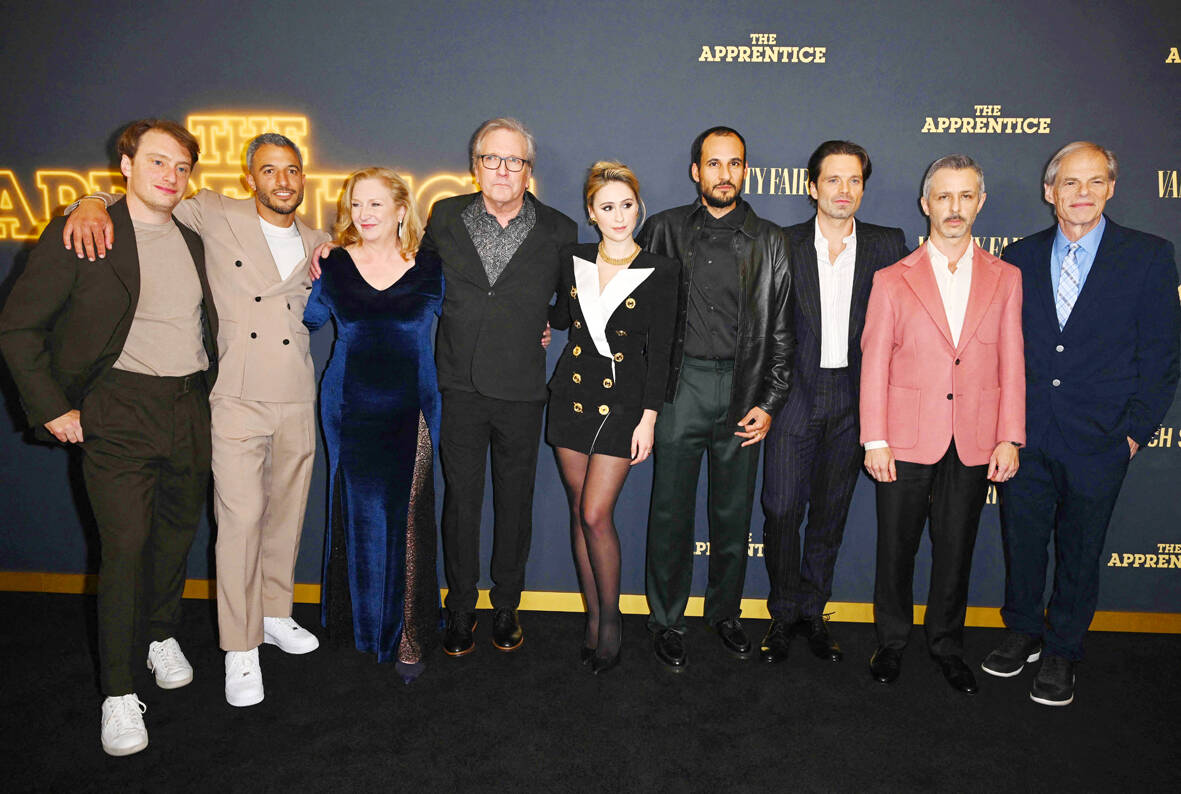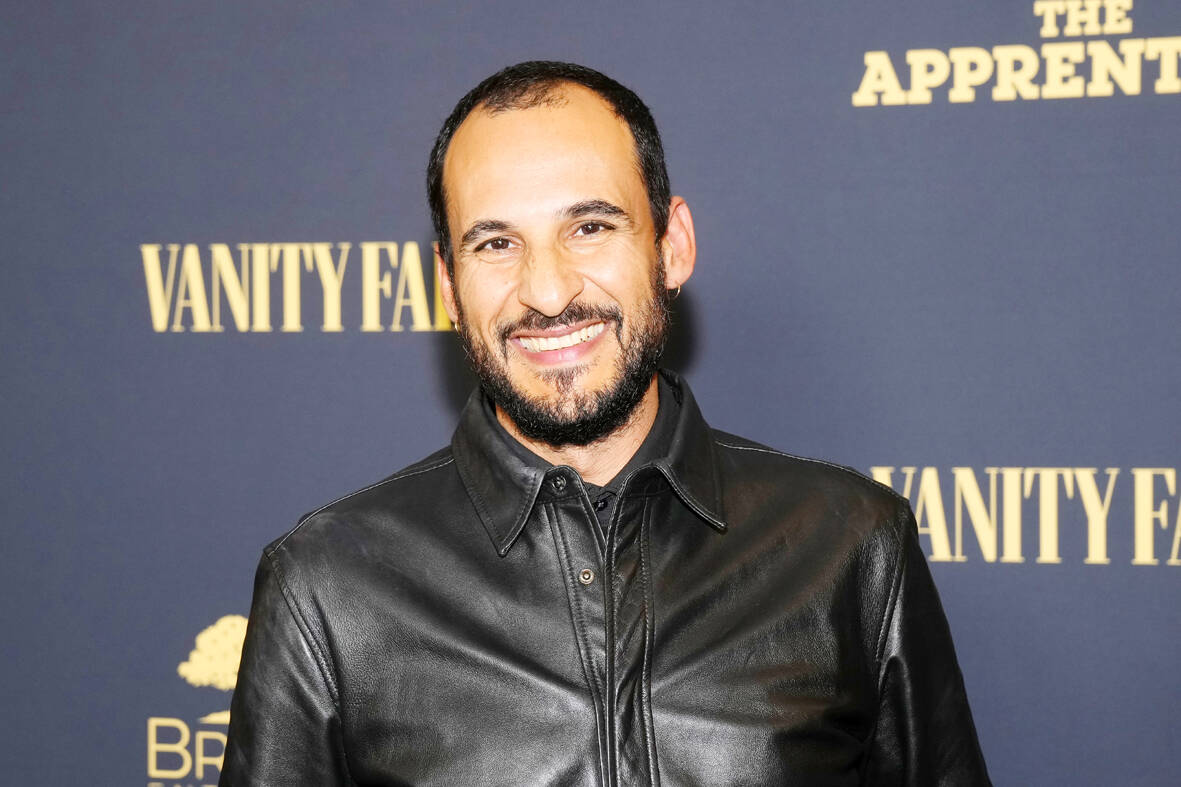In 1973, Donald Trump was a hungry, awkward real estate heir from Queens looking for respect in New York. Not particularly smart, not particularly charming and with no solid plan to combat a federal lawsuit over the family company’s discrimination against Black tenants, the young Trump was fumbling toward his dream of opening a lavish hotel near Grand Central. That is, until he met Roy Cohn, Senator Joseph McCarthy’s pugilistic prosecutor turned Richard Nixon confidant and political fixer, at a swanky New York club.
That’s the opening scene of The Apprentice, a new film out this month following a beleaguered journey to theaters. Written by Vanity Fair’s longtime Trump chronicler Gabriel Sherman and directed by the Iranian Danish film-maker Ali Abbasi, the film depicts the young Trump’s ascent in New York society in the 1970s and 80s via Cohn’s shameless tactics, as the lawyer’s health weakened due to HIV/Aids. The question dogging the film, starring a de-handsomed Sebastian Stan as Trump and Succession’s Jeremy Strong as Cohn, has been: does anyone want to watch a Trump movie? And after the film fizzled into a long period of distribution uncertainty following some positive reviews at the Cannes film festival in May — would anyone be able to watch it?
“I’m fine with people bashing us, praising us, whatever,” Abbasi, who previously made serial killer thriller Holy Spider, said. “What I’m not fine with, what really hurts, is the boycott or censorship that, effectively, we went through.”

Photo: AP
Even with two major stars attached, the independent film has had a torturous road to theaters. Following the film’s festival premiere, the Trump camp issued a cease-and-desist letter — unsurprising, given the former president’s litigiousness and the film’s material. The Apprentice depicts, among other things, Trump raping his first wife, Ivana (Maria Bakalova) — a fictionalized account of an alleged 1989 attack — and getting liposuction. Dan Snyder, a pro-Trump billionaire involved with Kinematics, the company that put up equity for the film against domestic rights, reportedly sought to block its release. Possibly spooked by the legal threats, various studios and streamers passed. At the 11th hour, Briarcliff Entertainment swooped in with a domestic distribution plan and awards push, though the film-makers still asked for US$100,000 in a Kickstarter campaign (dubbed “Release the Apprentice”).
According to Abbasi, who is based in Copenhagen, the distribution issue was less a juicy story of a rightwing billionaire and more an unrepentant liar getting their way than simple corporate logic: “Whatever makes money makes money, whatever doesn’t make money is not interesting.”
The calculation being that, though people will watch the movie, it could turn off more Maga subscribers or customers.

Photo: AFP
“For all the liberal surface of Hollywood — and I’m not saying they’re lying or anything — but I don’t think they’re willing to get into politics in any major, meaningful way,” Abbasi said.
The movie has, from the get-go, been a tough sell. “Trumpland thinks that we’re doing a hit job on Trump, but when we were doing the movie, all our liberal friends in Hollywood, they thought that we’re giving him too much oxygen,” said Abbasi. “We had people hanging up on us when we were crewing up, because we didn’t ‘hate’ Trump enough.”
To be clear, the film, which Sherman first conceived and wrote in 2017 — far before Cohn’s rules of “attack, attack, attack,” “admit nothing, deny everything” and “never admit defeat” manifested in efforts to steal a US presidential election — does not go easy on Trump. It’s a work of dramatization grounded in the historical record, which is as damning as you view it to be. (For people outside the Maga-verse, it’s pretty damning.)

Photo: AP
But it is attempting to do what may be impossible in America now: to talk about Trump without any political baggage, to set aside feelings on the man in the name of fact-based art.
“It’s not written to influence people’s minds,” Sherman said. “It’s written as art and what people take from it is their own choice.
“It’s such a universal story about the apprentice outstripping the master,” he added. “I hope people can experience it on its own terms and not bring all their political baggage to it.”
Nothing in the Apprentice is unknown to anyone who has paid attention to Trump beyond his recent political career. The film depicts his icy, disappointing relationship with his father (Martin Donovan); his more affectionate relationship with his alcoholic older brother Fred (Charlie Carrick), who died in 1981; his bumbling courtship with Ivana; and his blind eye toward Cohn’s homosexuality and bumbling attempts at respectability.
And perhaps most damning of all, his cheats, workarounds and outright lies — to the housing board, to the press — that worked because they aligned with others’ self-interest, and the ways that New York elites conferred legitimacy on a blowhard. (A New York Times profile comparing Trump to Robert Redford, read aloud by his mother Mary, is lifted directly from a real article helping to build Trump’s reputation as a legitimate New York businessman.)
“There’s a system, there’s a social Darwinism that is built-in in American society, that didn’t come with Trump and will not end with Trump,” said Abbasi, who maintains that The Apprentice is “not a Trump movie. It is about the becoming of the character Donald Trump as we know him today, through this very specific time and specific relationship.”
Over the course of the film, Trump, as played by Stan in as unexaggerated a way as someone could possibly do, becomes more and more like the recognizable figure today — bigger and with more bluster, operating with increasingly little sense of consequence. The most disturbing scene to watch — and the one that made headlines out of Cannes — is one in which he rapes Ivana in the late 1980s.
“I felt the film had to address that aspect of his character — it would be a whitewash of a movie if we didn’t acknowledge it in some way,” said Sherman, noting that Trump has been credibly accused of sexual assault by at least a dozen women, and was found liable by a New York jury for the assault of the former Elle columnist E Jean Carroll. The episode in question draws from Ivana’s own divorce deposition, behind closed doors and under oath, in 1990. (Ivana, who died in 2022, later made contradictory statements, though Sherman noted these were under pressure from Trump’s lawyers and, eventually, campaign team.)
“I wanted to feel like, OK, this man is our president he has this history of sexual assault — let’s look at it, let’s like make people actually see what that is like,” he said.
It’s one of several tough scenes to stomach, however much one has intellectualized Trump’s well-documented misconduct, and has, naturally, drawn the ire of Republicans. The former GOP presidential candidate Mike Huckabee publicly called for a boycott of the “anti-Trump” movie. (“They do first amendment only when it suits them, their freedom of speech only when it’s about fascism,” Abbasi said of Huckabee.)
Trump cronies aside, The Apprentice still faces an uphill battle to viewers. ABC and CBS have refused to air spots for the film during the campaign debates, a decision Briarcliff attributed to “timidity and cowardice.” And then there’s the hurdle of enticing audiences to watch a two-hour film about a man most Americans have a set opinion on, and a solid half would prefer to see less of.
“People are bringing a lot of preconceptions to this movie,” Sherman conceded, “but if they just allow themselves to sit in the theater and be surprised, I think they’ll have a really exciting time.”
Both Abbasi and Sherman pitched The Apprentice as many things: a New York movie about a bygone, sleazy, formative era. A tale of a corruptible system. A classic student becomes the teacher saga. An origin story. But it is first and foremost a dramatized portrait of Donald Trump, the person. Trump is “not an alien, he’s not from another planet. He’s human,” Sherman said. “We have to look at these people, even if you disagree with them, so that maybe the next time there is another Trump coming along we’ll recognize them as such.”
Ultimately, the film, like any movie, is up to interpretation.
“I think the audience is really smart,” said Abbasi. “They can make up their own mind, if they come in and give this a chance.”

The canonical shot of an East Asian city is a night skyline studded with towering apartment and office buildings, bright with neon and plastic signage, a landscape of energy and modernity. Another classic image is the same city seen from above, in which identical apartment towers march across the city, spilling out over nearby geography, like stylized soldiers colonizing new territory in a board game. Densely populated dynamic conurbations of money, technological innovation and convenience, it is hard to see the cities of East Asia as what they truly are: necropolises. Why is this? The East Asian development model, with

June 16 to June 22 The following flyer appeared on the streets of Hsinchu on June 12, 1895: “Taipei has already fallen to the Japanese barbarians, who have brought great misery to our land and people. We heard that the Japanese occupiers will tax our gardens, our houses, our bodies, and even our chickens, dogs, cows and pigs. They wear their hair wild, carve their teeth, tattoo their foreheads, wear strange clothes and speak a strange language. How can we be ruled by such people?” Posted by civilian militia leader Wu Tang-hsing (吳湯興), it was a call to arms to retake

Desperate dads meet in car parks to exchange packets; exhausted parents slip it into their kids’ drinks; families wait months for prescriptions buy it “off label.” But is it worth the risk? “The first time I gave him a gummy, I thought, ‘Oh my God, have I killed him?’ He just passed out in front of the TV. That never happens.” Jen remembers giving her son, David, six, melatonin to help him sleep. She got them from a friend, a pediatrician who gave them to her own child. “It was sort of hilarious. She had half a tub of gummies,

The wide-screen spectacle of Formula One gets a gleaming, rip-roaring workout in Joseph Kosinski’s F1, a fine-tuned machine of a movie that, in its most riveting racing scenes, approaches a kind of high-speed splendor. Kosinski, who last endeavored to put moviegoers in the seat of a fighter jet in Top Gun: Maverick, has moved to the open cockpits of Formula One with much the same affection, if not outright need, for speed. A lot of the same team is back. Jerry Bruckheimer produces. Ehren Kruger, a co-writer on Maverick, takes sole credit here. Hans Zimmer, a co-composer previously, supplies the thumping